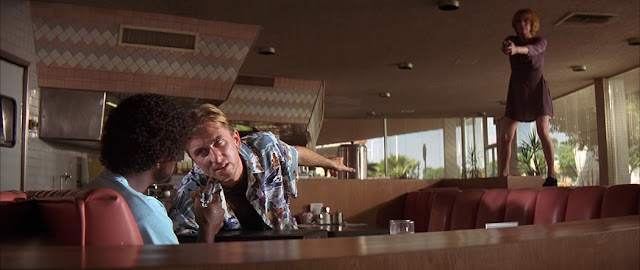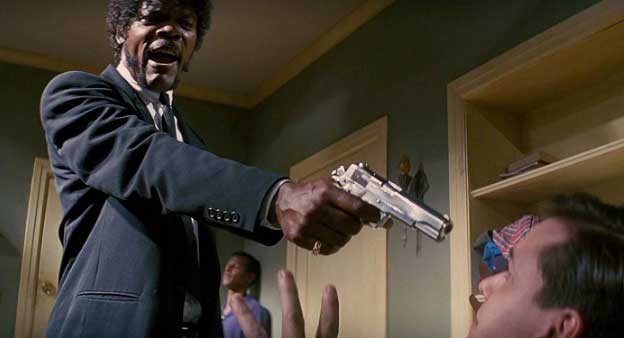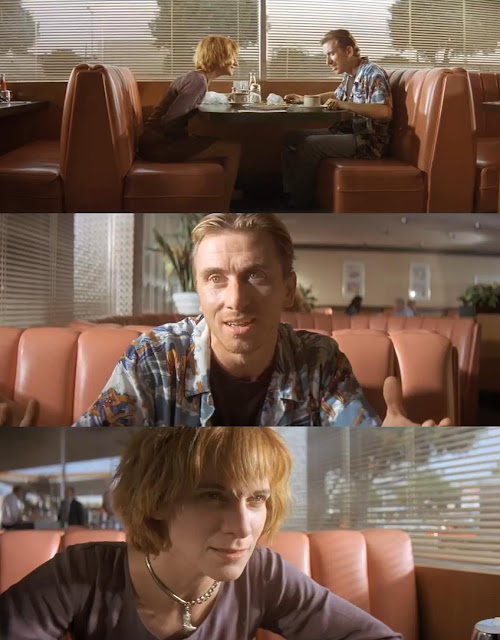Specialist Study Area 1: Narrative and Pulp Fiction
Questions in the exam could focus specifically on the ways in which choices regarding narrative create meaning for audiences and the ways in which Tarantino's manipulation of narrative structure contributes to the 'experimental' identity of Pulp Fiction. A number of other types of questions may require you to make reference to narrative - even if the term is not in the title. Answers to questions on representation or aesthetics may include discussion of the film's narrative structure and you should mention narrative in essays about institutional context (how choices regarding narrative may be as a result of the fact Pulp Fiction is a low-budget, Independent movie made by Miramax). Any discussion of the other critical debate studied for experimental film - auteur - will invariably require at least some discussion of Tarantino's manipulation of narrative structure (as it is such a key element of Tarantino's auteur signature). It is highly likely that any question on narrative will ask you discuss the ways that Tarantino's decisions regarding narrative structure contribute to the 'experimental' nature of the film, so you must be able to discuss what is different or unusual about Tarantino's construction of narrative, discussing the ways that it challenges what we are used to seeing in mainstream cinema.
Remember, questions on narrative will require you to discuss, in detail, certain scenes from Pulp Fiction - so make sure you have at least two scenes that you can recall in detail. In reality (time permitting) it would be a good idea to also mention at least one other scene; remember, that you are writing a Film Studies essay and, therefore, examiners will expect you to support your points at all times with discussion of examples from the film.
Opening and closing scenes are always useful to know in detail - this is particularly relevant to an essay on narrative because of the fact that much of Pulp Fiction is told out of chronological order (so, you may consider Captain Coons' Gold Watch monologue to be the opening moment of the story - looking at the film this way foregrounds the narrative significance of the gold watch - whilst the diner scene with Honey Bunny and Pumpkin is the opening scene as presented in the plot). Try, also, to memorise at least one other key scene - and make sure that you are able to make brief passing references to a number of other moments in Pulp Fiction.
As narrative is one of the Specialist Study Areas for Pulp Fiction, it is highly likely that one of the questions in the exam will ask you to discuss narrative. We have covered the material already on separate posts, but you should re-read the posts below to refresh your memory about the areas to discuss.
The key point to remember is that Tarantino's manipulation of chronological order is arguably the most 'experimental' element of Pulp Fiction. By placing story events out of chronological order in the plot Tarantino deconstructs the notion of narrative arcs (we see Vincent die and then later re-appear in the plot's final section, and we witness Jules' transformation at the end of the plot even though this has actually happened in the middle of the story) and contorts the conventional three-act structure that audiences are used to seeing in mainstream Hollywood films. Tarantino further undermines audience's narrative expectations by inter-weaving three separate stories (that are all linked) and by making it almost impossible for the audiences to distinguish the protagonists from the antagonists. The director also shows a number of scenes more than once, from different charcters' perspectives and whilst the storylines for some characters achieve resolution (positively for Butch, less so for Vincent) for others their stories are left open-ended (we don't, for example, find out what happens to Jules, Mia or Marcellus). It is possible to describe the narrative as circular (we begin and end the film at the same point in the plot) but this is only because of the non-linear way that Tarantino has chosen to present story events. There are, then, many ways in which we could describe the narrative of Pulp Fiction as 'experimental'.
As the film stands, and because of the ways that story events are presented in the plot, the spectator gets a satisfying ending in that Jules and Vincent leave the scene in the diner in possession of the moral high ground; Jules, in particular, appears to have achieved the transformation that audiences would expect from a film's protagonist - he has seen the error of his ways and has become a better person as a result. This ending is, in many ways, a conventional resolution if we are to see Jules and Vincent as the film's protagonists; the characters we have been positioned with achieve their goals and leave the narrative intact. However, the fact that we know that Vincent will subsequently die forces the spectator to revisit the film and to search for a comforting resolution (as is commonly found in Hollywood narratives); a resolution that just isn't there.
Apart from the film's intertextuality, the way it pays homage to other movies and its stylistic self-referencing, Pulp Fiction's narrative playfulness is arguably its most obvious postmodern trait. The film's narrative is episodic (there are a series of stories), but also circular and is unusually 'experimental' in the way that it treats time. In the middle of the 'Second Act', for example, Butch kills Vincent, who is now acting as a secondary character in Butch's story (as opposed to a key protagonist in the scenes at the beginning of the plot with Jules at the apartment and in his own story with Mia). In the 'Third Act' the audience return to the story of Vincent and Jules (introduced in the 'First Act' of the film). This unusual plotting device may have been one of the reasons behind Columbia Picture's refusal to fund the film (despite the success Tarantino had already had with Reservoir Dogs) but it is surprisingly effective from a spectator's viewpoint. The audience gets much pleasure from meeting Vincent again (particularly as we have warmed to him in his scenes with Mia) and, for the rest of the film (at least until the credits roll at the end) we forget about the shock of his death.
Typical questions related to narrative can be found below. It is important that you attempt them, combining the notes above with your own analysis of key scenes. When practicing essays it will help with your revision if you re-watch moments from the film and pick appropriate scenes to analyse. Remember, before you attempt a question on narrative you must re-read the other posts (links to which are earlier in this post) so that you have all the information you need.
1. Explore how far the narrative construction can be considered to be 'experimental' in your chosen film.
3. Explore how aspects of narrative are used experimentally to enrich meaning in your chosen film. Make detailed reference to particular sequences in your answer.
4. Explore how far your chosen film is experimental in challenging conventional approaches to narrative. Make detailed reference to particular sequences in your answer.
5. Discuss the impact of two key experimental features of the narrative in your chosen film option. Make detailed reference to particular sequences in your answer.
6. To what extent does your chosen film demonstrate a bold experiment in narrative? Make detailed reference to particular sequences in your answer.
7. 'Unexpected approaches to narrative can be both difficult and exciting for the spectator.' Discuss this statement in relation to your chosen film. Make detailed reference to particular sequences in your answer.
You may wish to discuss some, or all, of the following in relation to the narrative structure in Pulp Fiction, giving examples of scenes from the film alongside discussing the potential reasons why Tarantino may experiment with narrative structure and the effects this experimentation has on the audience.
- The distinction between plot and story and the importance of cause and effect
- Tarantino's presentation of story events out of chronological order in the plot
- Passive and active spectatorship
- Temporal frequency
- Narrative positioning with characters and determining which characters are protagonists/antagonists
- Binary oppositions
- Fractured, non-linear narrative structure as an element of Tarantino's auteur signature
The key point to remember is that Tarantino's manipulation of chronological order is arguably the most 'experimental' element of Pulp Fiction. By placing story events out of chronological order in the plot Tarantino deconstructs the notion of narrative arcs (we see Vincent die and then later re-appear in the plot's final section, and we witness Jules' transformation at the end of the plot even though this has actually happened in the middle of the story) and contorts the conventional three-act structure that audiences are used to seeing in mainstream Hollywood films. Tarantino further undermines audience's narrative expectations by inter-weaving three separate stories (that are all linked) and by making it almost impossible for the audiences to distinguish the protagonists from the antagonists. The director also shows a number of scenes more than once, from different charcters' perspectives and whilst the storylines for some characters achieve resolution (positively for Butch, less so for Vincent) for others their stories are left open-ended (we don't, for example, find out what happens to Jules, Mia or Marcellus). It is possible to describe the narrative as circular (we begin and end the film at the same point in the plot) but this is only because of the non-linear way that Tarantino has chosen to present story events. There are, then, many ways in which we could describe the narrative of Pulp Fiction as 'experimental'.
As the film stands, and because of the ways that story events are presented in the plot, the spectator gets a satisfying ending in that Jules and Vincent leave the scene in the diner in possession of the moral high ground; Jules, in particular, appears to have achieved the transformation that audiences would expect from a film's protagonist - he has seen the error of his ways and has become a better person as a result. This ending is, in many ways, a conventional resolution if we are to see Jules and Vincent as the film's protagonists; the characters we have been positioned with achieve their goals and leave the narrative intact. However, the fact that we know that Vincent will subsequently die forces the spectator to revisit the film and to search for a comforting resolution (as is commonly found in Hollywood narratives); a resolution that just isn't there.
Apart from the film's intertextuality, the way it pays homage to other movies and its stylistic self-referencing, Pulp Fiction's narrative playfulness is arguably its most obvious postmodern trait. The film's narrative is episodic (there are a series of stories), but also circular and is unusually 'experimental' in the way that it treats time. In the middle of the 'Second Act', for example, Butch kills Vincent, who is now acting as a secondary character in Butch's story (as opposed to a key protagonist in the scenes at the beginning of the plot with Jules at the apartment and in his own story with Mia). In the 'Third Act' the audience return to the story of Vincent and Jules (introduced in the 'First Act' of the film). This unusual plotting device may have been one of the reasons behind Columbia Picture's refusal to fund the film (despite the success Tarantino had already had with Reservoir Dogs) but it is surprisingly effective from a spectator's viewpoint. The audience gets much pleasure from meeting Vincent again (particularly as we have warmed to him in his scenes with Mia) and, for the rest of the film (at least until the credits roll at the end) we forget about the shock of his death.
Typical questions related to narrative can be found below. It is important that you attempt them, combining the notes above with your own analysis of key scenes. When practicing essays it will help with your revision if you re-watch moments from the film and pick appropriate scenes to analyse. Remember, before you attempt a question on narrative you must re-read the other posts (links to which are earlier in this post) so that you have all the information you need.
1. Explore how far the narrative construction can be considered to be 'experimental' in your chosen film.
OR
2. 'Experimental film is often the result of an auteur challenging established conventions with fresh ideas.' Discuss this statement in relation to narrative structure with reference to key sequences from your chosen film.
OR
OR
OR
OR
OR











Comments
Post a Comment